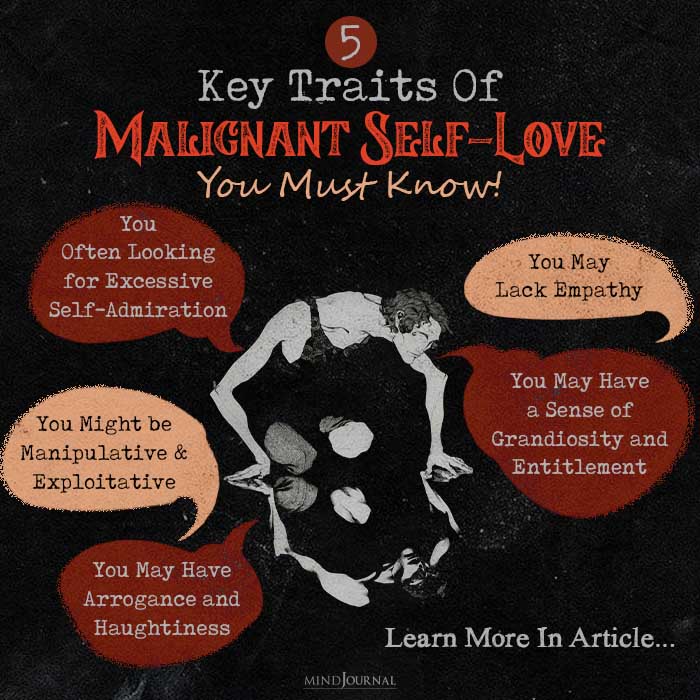Ever met someone who seems to think the world revolves around them? That’s what we call “malignant self-love.” It’s when a person becomes so self-centered that they overlook the feelings and needs of others.
For instance, think about a person who always needs to be the center of attention or has to get their way, regardless of how it affects others around them. Identifying these behaviors can be life-saving.
Knowing what signs to look for will help us avoid falling into this egotistical mindset ourselves and promote healthier relationships with other people too. Here are some of the signs and traits to recognize malignant or narcissistic self-love.
What is Malignant Self-Love?

Malignant self-love is coined by Dr. Sam Vaknin. This is a term used to describe the twisted kind of self-love that narcissists often display.
While self-love in moderation is healthy and necessary for self-esteem, malignant self-love takes it quite far as sometimes demonstrated through manipulations, exploitations, and heartlessness.
Read More: How To Identify A Narcissist: 9 Common Traits of Narcissism?
How to Recognize Malignant Self-Love in Yourself?
The cure for this is only possible if one becomes aware of his/her malignant self. Below are some queries:
- Do I seek constant admiration and validation from others?
- Do I struggle to empathize with others’ feelings and perspectives?
- Do I often manipulate or exploit others to get what I want?
- Do I feel entitled to special treatment and privileges?
- Do I exhibit arrogant or condescending behaviors towards others?
If you find yourself answering “yes” to these questions, it might be worth exploring these behaviors further, possibly with the help of a mental health professional.
What are the Signs of Malignant Self-Love?

A few signs of malignant or too much self-love that are visible but we often ignore are as follows:
1. You Might Often Look for Excessive Self-Admiration
This is one of the most common traits of too much self-love. People with malignant self-love crave constant admiration and validation. They seek attention and praise to such an extent that it becomes almost insatiable.
They might boast about their achievements, exaggerate their talents, and demand recognition. In addition, they often become upset or angry when they don’t receive the adulation they believe they deserve.
2. Lack of Empathy
Empathy means understanding someone else’s feelings or emotions by putting yourself in their shoes. People with malignant or narcissistic self-love sometimes lack this particular ability.
They have a hard time recognizing or caring about others’ emotions and needs and are often preoccupied with their own desires and goals, making it difficult for them to engage in authentic relationships.
3. Manipulative and Exploitative Behavior
Manipulation and exploitation are some of the common tactics used by individuals who have toxic self-love. They exploit other people for their selfish gains without bothering what will happen to such people.
This could include lying, threats, or other forms of psychological manipulation to fulfill their wants.
4. Grandiosity and Entitlement
A sense of grandiosity and entitlement is a hallmark of malignant self-love. These individuals believe they are superior to others and deserve special treatment.
They would expect others to only care about them as they keep enjoying life while others work tirelessly. They would feel no guilt at all since they think that they deserve it.
5. Arrogance and Haughtiness
Arrogance and a condescending attitude are also common. Those with malignant self-love often look down on others, viewing them as inferior or unworthy.
This arrogance can lead to conflicts and strained relationships, as others may find their demeanor intolerable and offensive.
Read More: The Most Narcissistic Zodiac Signs, RANKED From Most To Least
The Impact of Malignant Self-Love on Relationships
Malignant or narcissistic self-love doesn’t just affect the individual; it has a profound impact on their relationships. Here are some ways it can manifest:
- Toxic Relationships: Relationships with someone who has excessive self-love can be incredibly toxic as they indulge in emotional abuse and manipulation.
- Isolation: Over time, the selfish and exploitative nature of someone with malignant self-love can lead to isolation.
- Emotional Drain: Being in a relationship with someone who exhibits toxic self-love can be emotionally draining.
Read More: 7 Signs of A Female Narcissist
Overcoming Malignant Self-Love
Recognizing malignant self-love is the first step toward change. Here are some strategies to help overcome it:
- Cultivate Empathy: Work on understanding and sharing the feelings of others. Practice active listening and try to see things from other people’s perspectives.
- Seek Professional Help: Therapy can be incredibly beneficial. Cognitive-behavioral therapy (CBT) and other therapeutic approaches can be particularly effective.
- Practice Self-Reflection: Journaling or mindfulness practices can be useful tools in this process.
- Build Healthy Relationships: Focus on building relationships based on mutual respect and understanding.
Avoid Malignant Self-Love for You and Your Loved Ones
So, malignant self-love is something that can happen to anyone if they try to stop everything that is coming in their way in the name of boundaries, and self-love. So, try to figure out the reasons behind your malignant obsession with yourself and refrain from them for good.
Frequently Asked Questions (FAQs)
1. What is malignant or toxic self-love?
Toxic self-love is an extreme form of narcissism characterized by toxic and harmful behaviors.
2. How can you identify toxic self-love?
It can be identified by traits like a lack of empathy, excessive need for admiration, and manipulative behavior.
3. Why is it important to avoid malignant self-love?
Avoiding malignant self-love is crucial for maintaining healthy relationships and personal well-being.
















Leave a Reply
You must be logged in to post a comment.